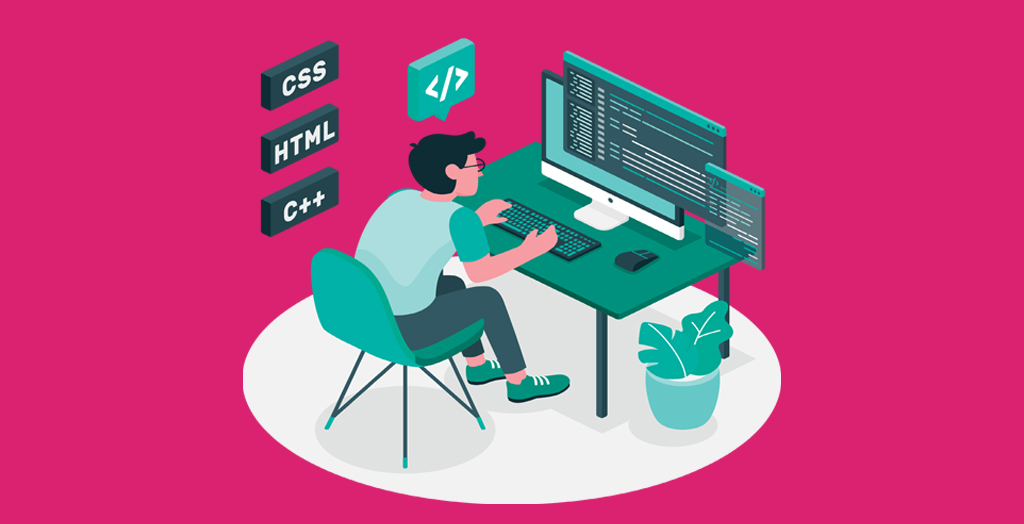However, it is quite acceptable to pursue more than one job route throughout your lifetime. If you’ve arrived here, you’re undoubtedly thinking that front-end development is the ideal next step for you.
In this post, we’ll discuss what a frontend developer is, how to become one, and some of the most important things you’ll need.
What Exactly Is a Front End Developer?
A front-end developer is a professional who is in charge of the interface’s design and execution. Users need this interface to access the program at hand. A web designer is a specialist who produces the look and design of a website. And, using coding languages like CSS, HTML, and JavaScript, the front-end developer ensures that the design works online.
Frontend Developer Responsibilities
Frontend developers are often responsible for developing code, evaluating code, troubleshooting programs, and putting plans into action. What is the outcome of these tasks? Providing a consistent user experience.
Front-end developers work in areas where design and functionality intersect. They’ll select how interactive an element should be or work on the layout. However, they also pay attention to how things are written and guarantee that other developers can comprehend their work.
If you need help with front-end development from professionals, follow this link: https://devoxsoftware.com/services/front-end-development-services/.
What Do You Need to Become a Front-End Developer?
Discover Front-End Development
You will begin by studying and mastering three critical technologies for frontend development:
- CSS is in charge of how a website/web app looks.
- HTML is in charge of what is on a website/web app. Similar to the human skeleton.
- JavaScript – A website’s nervous system (how it works). In charge of the how of a website/web app.
There are several computer languages and tools available for developing websites and online apps, such as jQuery and JavaScript frameworks.
Learn About Front-End Frameworks
After you’ve mastered HTML, CSS, and JavaScript, you’ll need to study a variety of Front-End frameworks based on your needs and preferences. Front-End frameworks are libraries of previously written code that make front-end development simpler and more efficient owing to features such as reusable components, etc. When it comes to CSS, Bootstrap is the most popular framework on the market. Furthermore, other well-known frameworks like Angular, React, Vue, and others might be considered for front-end development.
Practice
Begin by creating little sections of a user interface using your newly acquired knowledge, then progressively expand. Don’t be concerned if you make errors. We may learn more from our errors than from flawless performance.
So you must now use all of your front-end development knowledge and talents in the real world. You may begin by creating multiple mini-projects such as a Quiz Game, To-Do List, and so on, and then progress to larger projects such as an Audio Player, Chatting Platform, and so on. It will provide you with much-needed hands-on experience as well as extensive exposure to front-end development.
Understand the Command Line
It’s a good idea to have a basic grasp of issues like file display and file system navigation if you want to work in web design. On a similar point, you should get acquainted with Shell’s properties, which are used to access operating system operations via a text interface.
Create a Portfolio
It is one of the most important elements to consider if you want to start a career as a Frontend Developer. Whether you’re looking for a position in an organization or starting your own business, you need to demonstrate to recruiters or customers your prior work to be recognized. Furthermore, particularly for novices, you may begin by developing a basic static website for yourself where you can showcase your finished projects, as well as the tools and technologies you use and your contact information. A well-designed portfolio can undoubtedly assist you in better demonstrating your talents, giving you an advantage over others.
Conclusion
The road to becoming a front-end developer will undoubtedly be long. As stated in this blog article, being a front-end developer entails more than just learning different front-end frameworks and programming languages. It is about how you interact, your obligations, and your tasks as a front-end developer.
Great front-end developers should never stop learning since the web is a constantly changing realm. Following front-end gurus on Twitter, for example, will influence your learning curve.
You’ll need some perseverance to get there. Rushing makes no sense since it will not make you happy. Always remember to have fun while learning and exploring.
